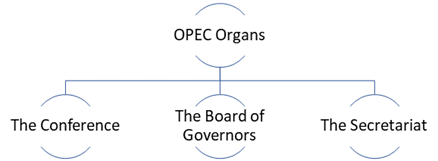What is OPEC?
OPEC stands for Organization of the Petroleum Exporting Countries. It is an intergovernmental organisation formed in September 1960 at the Baghdad Conference held from 10-14 September 1960. The headquarters of OPEC is located in Vienna since 1965. Before 1965 it had its headquarters in Geneva, Switzerland.
At the initial stage, the organisation was formed by five founding member countries, later joined by eleven more members. At present, there are 13 member countries as of January 2021.

Data as on January 2021, Image Data Source: OPEC
As per the statute of OPEC any country can opt for the membership, the primary condition being the nation must be a net exporter of oil and the thoughts of the nation ought to be like OPEC.
As per the OPEC website, Member countries houses around 79.4% of the world proven oil reserves, with around 64.5% located in the Middle East. The net addition in cumulative production during 2009-2018 by Non-OPEC countries was 24.6 billion barrels. In contrast, it was 186.2 billion barrels for OPEC countries, far ahead than Non-OPEC countries.
Why was OPEC formed?
OPEC was formed during the international economic transition phase when extensive decolonisation was taking place. The international oil market was monopolised by certain big players present in the market till 1970.
The syndicate's objective is to coordinate and standardise the petroleum policies in member countries for stabilising oil prices in the international market, safeguarding the smooth supply of oil to petroleum consumers and appropriate returns for suppliers in the global market.
Who are the decision-makers in OPEC?
OPEC Secretariat is the apex body which regulates the organisation. It is also responsible for executing all resolutions and decision making related to oil prices, production and related issues. The organs of the organisation pass the decision. The three organs are The Conference, The Board of Governors and The Secretariat.

Image Data Source: OPEC
The Conference is the supreme authority of the organisation, which consists of representative delegations from member countries. Each member has one vote, and a quorum of a three-quarter member is necessary for holding a conference.
The Board of Governors consists of governors nominated by Member Countries and confirmed by the Conference. It is responsible for managing the organisation, convening the Conference and drawing up the annual budget.
The Secretariat carries outs the executive functions of the syndicate following the directions of Board of Governors and provisions of the statute. The Secretariat consists of a Secretary-General, who is appointed as the Organization's Chief Executive Officer by the Conference for three years. It further comprises the Office of the Secretary-General, the Legal Officer, the Research Division and the Support Services Division.
 Please wait processing your request...
Please wait processing your request...